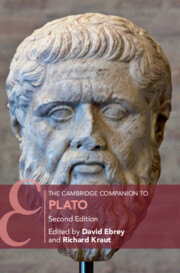Book contents
- The Cambridge Companion to Plato
- Other Volumes in the Series of Cambridge Companions
- The Cambridge Companion to Plato
- Copyright page
- Contents
- Contributors
- Acknowledgments
- Chronology
- Abbreviations
- 1 Introduction to the Study of Plato
- 2 Plato in his Context
- 3 Stylometry and Chronology
- 4 Plato’s Socrates and his Conception of Philosophy
- 5 Being Good at Being Bad: Plato’s Hippias Minor
- 6 Inquiry in the Meno
- 7 Why Erōs?
- 8 Plato on Philosophy and the Mysteries
- 9 The Unfolding Account of Forms in the Phaedo
- 10 The Defense of Justice in Plato’s Republic
- 11 Plato on Poetic Creativity: A Revision
- 12 Betwixt and Between: Plato and the Objects of Mathematics
- 13 Another Goodbye to the Third Man
- 14 Plato’s Sophist on False Statements
- 15 Cosmology and Human Nature in the Timaeus
- 16. The Fourfold Classification and Socrates’ Craft Analogy in the Philebus
- 17 Law in Plato’s Late Politics
- Bibliography
- Index Locorum
- General Index
- Other Volumes in the Series of Cambridge Companions (continued from page iii)
8 - Plato on Philosophy and the Mysteries
Published online by Cambridge University Press: 21 July 2022
- The Cambridge Companion to Plato
- Other Volumes in the Series of Cambridge Companions
- The Cambridge Companion to Plato
- Copyright page
- Contents
- Contributors
- Acknowledgments
- Chronology
- Abbreviations
- 1 Introduction to the Study of Plato
- 2 Plato in his Context
- 3 Stylometry and Chronology
- 4 Plato’s Socrates and his Conception of Philosophy
- 5 Being Good at Being Bad: Plato’s Hippias Minor
- 6 Inquiry in the Meno
- 7 Why Erōs?
- 8 Plato on Philosophy and the Mysteries
- 9 The Unfolding Account of Forms in the Phaedo
- 10 The Defense of Justice in Plato’s Republic
- 11 Plato on Poetic Creativity: A Revision
- 12 Betwixt and Between: Plato and the Objects of Mathematics
- 13 Another Goodbye to the Third Man
- 14 Plato’s Sophist on False Statements
- 15 Cosmology and Human Nature in the Timaeus
- 16. The Fourfold Classification and Socrates’ Craft Analogy in the Philebus
- 17 Law in Plato’s Late Politics
- Bibliography
- Index Locorum
- General Index
- Other Volumes in the Series of Cambridge Companions (continued from page iii)
Summary
The chapter aims to show that Plato’s engagement with mystery cults – the Eleusinian mysteries and Orphic cults in particular – can illuminate centrally important topics of Plato’s philosophy, including his conception of the philosophical life, its relation to the human good, the role of memory in the knowledge of the Forms, and the soul’s kinship to the divine. It explores why and how Plato presents philosophy as the true initiation which can fulfil the promise of the mystery cults to offer the best human life and afterlife. It analyses why and how Plato describes the knowledge of the Forms on the model of the direct encounter with the divine at the culmination of a mystery ritual. It further suggests that the ‘birth’ announced at the highest point of the Eleusinian mysteries can shed new light on the role of ‘giving birth’ at the culmination of the philosophical life in the Symposium. Finally, it shows how Pythagorean and Orphic focus on memory offered Plato a framework to develop his account of the relationship between the soul and the divine Forms, reincarnation, and the fate of our soul in the afterlife.
- Type
- Chapter
- Information
- The Cambridge Companion to Plato , pp. 233 - 267Publisher: Cambridge University PressPrint publication year: 2022

